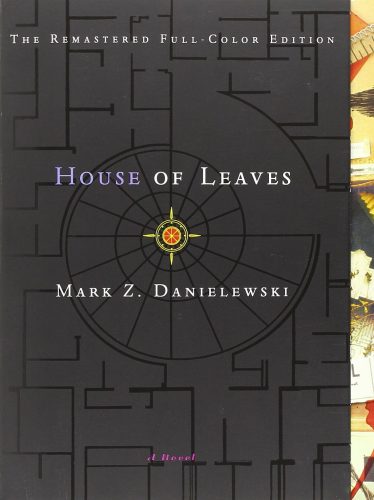
Years ago, I heard stories about a strange book: House of Leaves by Mark Z. Danielewski. The person claimed it was a horror book, but that it was so much more. It used narrative within a narrative within the narrative to tell its story, bouncing between these moments via footnotes within the text itself. They said it used the book itself as a way to tell the story, with the edges of the paper acting as the walls of the haunted house, and the words were the characters trying to find their way through to the other side.
I’m sure they said the name of the book, but it was lost somewhere within my mind. And for years I thought nothing more of it.
And then, as these things do, it reappeared on my radar, randomly mentioned on a podcast. At my desk, I scrawled the name on a scrap piece of paper before looking it up on the internet. It didn’t take long for me to remember the previous conversation about the novel, so I went ahead and put it on my Christmas list in the hopes some family member might purchase it for me. Sure enough, that wish was granted.
But I waited.
I read most of the books I have on Kindle. Yet, this was a book – well, I’m not sure there would be a way to construct it for digital consumption. It almost demands you have the tactile sensation of holding it in your hands. Flipping the pages and then flipping the orientation of the book. So I saved this beast for the beach.
I have a habit of not always choosing the bright and cheerful books for the beach, having read The Road a couple of years ago. House of Leaves demanded a different level of focus from me than I’d been expecting – so much so that after a day of reading. I was only at about 50 pages into the book. I’m a fast reader, but this crawled along.
Note that’s not a slight on the book, instead it speaks more to how the book is laid out.
One of the things I have learned in writing comics (and am always learning) is the idea of the pace of reading a page. Typically, if I want to slow the reader down (maybe because there is something coming that needs to be built up) I add more words to the page. Narration boxes, dialogue, etc.
And on those pages that need fly by, to feel fast, I include fewer words, let the art breathe a bit more.
House of Leaves is the 1st book I’ve ever seen that attempts to do this as well. Pages will have only a couple of a couple of sentences, a word presented upside down, twisting and turning on the page.
It uses footnotes, editors ramblings, forward, and appendices to paint a picture of how this House affects these people throughout the world. Students write theses on it (within the world it has constructed).
It’s complex and confusing and maddening and at times you can’t put it down and at other times you are unsure whether to pick it back up.
It has highs and lows as to what held my interest more, but once things get “weird”. I was devouring pages.
It may make you obsess. I found myself looking for answers to some questions while still reading, chastising myself for doing it as I didn’t want to spoil anything.
***

What is House of Leaves about? It’s about multiple things – a weird, possibly haunted house and the people who live there. A documentary made by those people who live in the house. The world at large’s thoughts on the doc.
But it is also about a man who had written “House of Leaves”
Oh and about the man who found the “House of Leaves” manuscript.
And the subject of the manuscript. The one who made the documentary. The one who journeys into the darkness within the house itself. That’s where the book really shifts into forcing you to turn your book sideways or upside down. The text will shrink the gutters on one page before expanding to the next. You’ll have pages with only a dozen words on it.
It pulls you in. All the techniques, which on the surface appear to be a pain in the ass, all serve the same goal. Through this, it makes you a part of the story. As much as any of the people you’re reading about.
It’s horror, but not always scary, but quite often disturbing. It’s the type of book that pushes the boundaries of what a novel can actually look like. Fiction upon fiction upon fiction. If you want to read something odd and strange and something that will have you searching the internet at 2 in the morning to try to figure out… this might be the book for you.
***
Most of the time book reviews/reflections/whatever want to be a little vague so they don’t spoil anything, but I honestly think that I couldn’t give anything away without giving everything away. A strange and amazing read. I’ve seen book reviews online for this where the person says they hated the book in one sentence and yet they recommend everyone read it. Such a strange thing to be said about anything.
So I’ll say, if you want to read something pretty unique… this is the one.
***
John McGuire has co-written, along with his wife, two Kindle Worlds novellas set in the world of Veronica Mars: Theft & Therapy and There’s Something About Mac.
He is also the creator/author of the steampunk comic The Gilded Age. The Trade paperback collecting the first 4 issues is finally back from the printers! If you would like to purchase a copy, go here!
Want to read the first issue for free? Click here! Already read it and eager for more?
Click here to join John’s mailing list.
His other prose appears in The Dark That Follows, Hollow Empire, Beyond the Gate, and Machina Obscurum – A Collection of Small Shadows.
He can also be found at www.johnrmcguire.com





